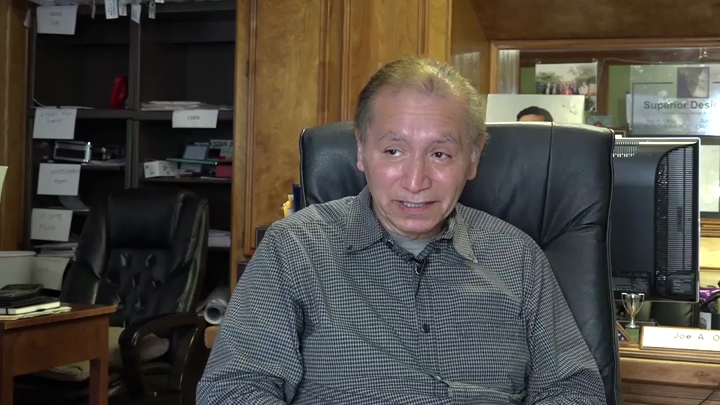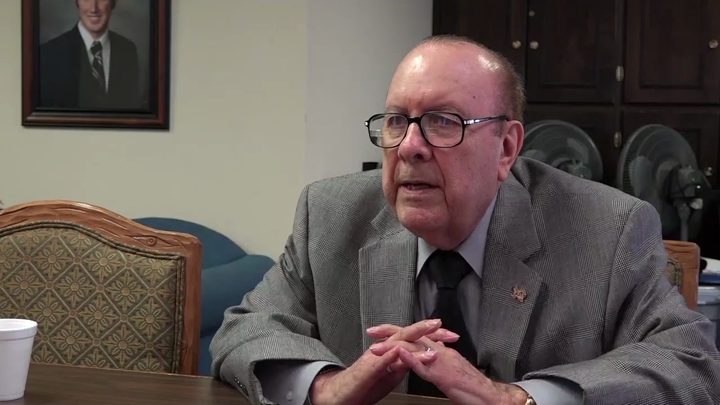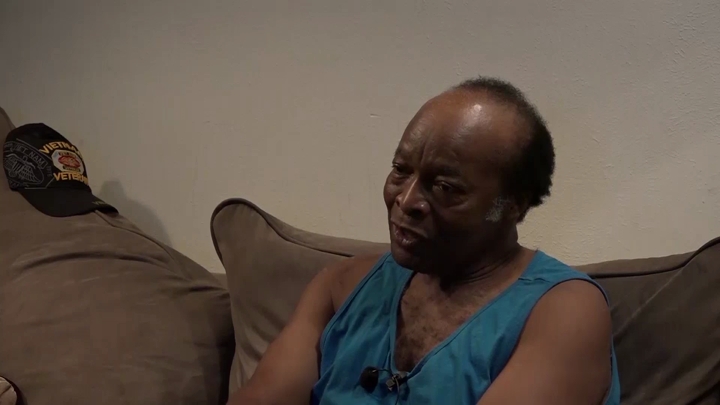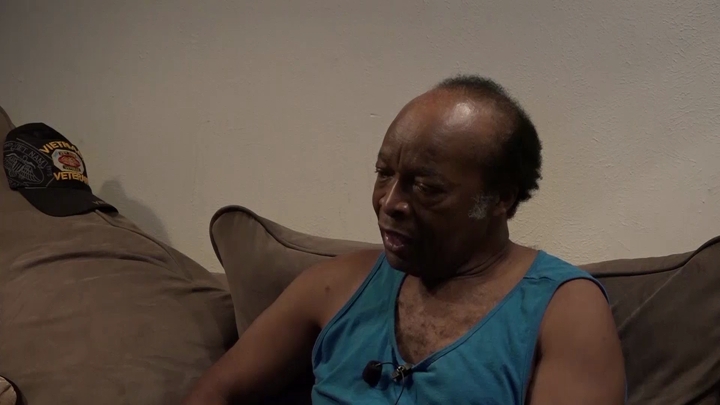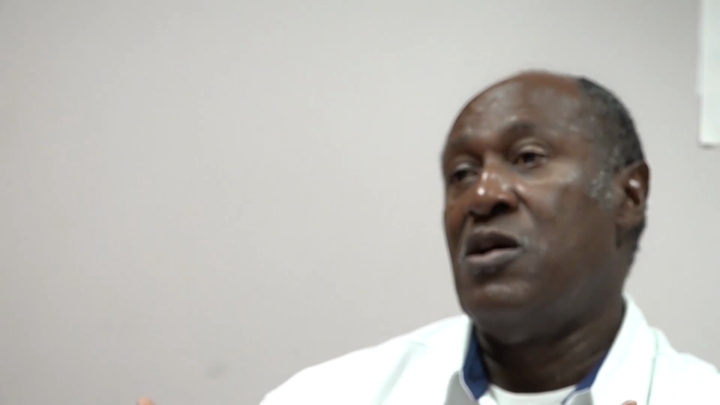Payne / Childhood Experiences and the Civil Rights Era
sign up or sign in to add/edit transcript
Interviewer: I’m curious about when you grew up—when you were growing up, it was during an era after Vietnam, after or towards the end of what’s commonly called the civil rights movement, and during the Black Power era. I’m curious about how some of those things affected your consciousness and if they did. Payne: You know, I remember I was in the fifth grade when we watched Roots, when Roots first came out. I was pissed off like everybody else. My teacher was white. My fifth-grade teacher was white, and I think she recognized that we were all not happy with what we saw. Roots was like a series. It was for a whole week and, you know, we watched it. The first time we were like, ehh let’s see. Then we kind of got into it and we started watching it every night. I remember coming back to school, “I wish somebody would say something to me. Just, oh please say something to me.” I really wasn’t happy, and I was ready to take some stances on some things. I did. I wouldn’t call myself radical. I guess you probably would say I’m radical. I remember the sixth grade my teacher—I was in an accelerated class my teacher—I was in an accelerated class—my teacher, his name was Mr. Dombrowski, they wanted us to go on this show that you compete academically against other schools, and you could have a cheering section. Well, they came to our class to get competitors because we were the accelerated class. Well it was time for us to select the people who were going to come cheer us on, and I wanted, of course, my classmates to be there. They said since we got the participants from your class, we’re going to go and get the students from the other class, the cheering section form the other class. I’m like “No, no, no, no. I want my friends to come cheer for me.” Then they said, “No that’s not fair.” “You came and got us, so I want my class to cheer.” The principal, who was white, decided he was going to kind of flex his muscle and show me that you’re going to do it my way. I said I just won’t compete. You can go to that class and get whoever you want, I’m not competing. He tried to threaten me with “Well, I’ll just see if we don’t have to suspend you.” You know, I was in the sixth grade, but I wasn’t stupid. He’s like well, we’ll just call your mother. I said you call my mother, I’m not doing it. Unless—I think it was called the dog pound—unless my classmates sit in the dog pound, I’m not competing. He brought me in the office and me and a guy named Charles Sanders were sitting there. I was kind of scared because like my mom’s going to kill me, but I had taken a stand. I am not going to—if my friends can’t be there—I am not competing. You can go get them to compete. They’re not as smart as our class. You know it. That’s why you came and got us. If you want me to do it, they’re going to be there, and I did not participate, and my mom stood with me. Of course, he couldn’t suspend me for that, but he kind of threatened it. At that point I knew, you know what, knowledge is power. I knew he couldn’t suspend me for it and I was just going to take a stand. After watching Roots and watching people take stands and stand for what they believe in, it kind of motivated me to make sure that I’m not going to let people just push me around. It’s interesting, our school competed and didn’t win. A lot of the questions, I knew the answers to. When they competed, see I knew that answer. If you’d have let my friends come, we would have won this competition, but y’all didn’t do that. It was kind of—I shouldn’t say that, but I was kind of happy we lost because you didn’t bring your best. You tried to force something that we didn’t believe in and I wasn’t going to let that happen. So, we’ve had some changes since then. You know, Coretta Scott King came down to Beaumont about fifteen years ago and I had a chance to visit with her and—a long time, my wife and I spent hours with Mrs. King and she got a chance to tell us a lot about her relationship with Dr. King. She called him Martin which was kind of weird to be sitting there and she’d say, you know Martin. I’m like she’s talking about Dr. King! To sit here and listen to her talk about what he went through really exposed the history and made it reality. I look at civil rights, Black Panthers, all these other organizations that were coming up in the seventies. I think that it was necessary. I didn’t necessarily subscribe to all their political ideology, but I think, just as you’ve got this racial group over talking about racial justice and you’ve got this group over here talking about state’s rights and Confederacy and all the other stuff. I think that you almost have to have both—not that you have to subscribe to either one--because they bring issues out there that everyone’s thinking but won’t say. A lot of people have issues with Al Sharpton about some of the positions he takes. I don’t necessarily believe in a lot of the things he says, but a lot of the stuff he says makes sense. You don’t have to like it, but it’s true. He’s just saying what everybody else is thinking, but they won’t say it. When David Duke decided to run for whatever office he ran for. What do you think about David Duke? I don’t have issues with David Duke. He says he don’t like black people. That’s fine. I don’t like you either. My issue are the David Dukes who won’t say that and they sit on boards and I walk in thinking that I’ve got a shot and I really have no shot at all because they don’t like me when I’ve walked in the room.
| Interview | Interview with James Payne |
| Subjects | Oral Tradition |
| Family › Childhood Experiences | |
| Community Organizations › Civil Rights Organizations | |
| Direct Action | |
| Black Power › Black Panthers | |
| People › King, Martin Luther, Jr. | |
| Ideology › Radicalism | |
| Tags | King, Coretta Scott |
| Sharpton, Al | |
| sign up or sign in to add/edit tags | |
| Interview date | 2016-06-16 |
| Interview source | CRBB Summer 2016 |
| Interviewees | Payne, James |
| Interviewers | Grevious, Danielle |
| Duration | 00:06:53 |
| Citation | "Childhood Experiences and the Civil Rights Era," from James Payne oral history interview with Danielle Grevious, June 16, 2016, Beaumont, Civil Rights in Black and Brown Interview Database, https://crbb.tcu.edu/clips/3185/childhood-experiences-and-the-civil-rights-era, accessed February 26, 2026 |


